Marine Life & Conservation Blogs
Why every day should be World Oceans Day…
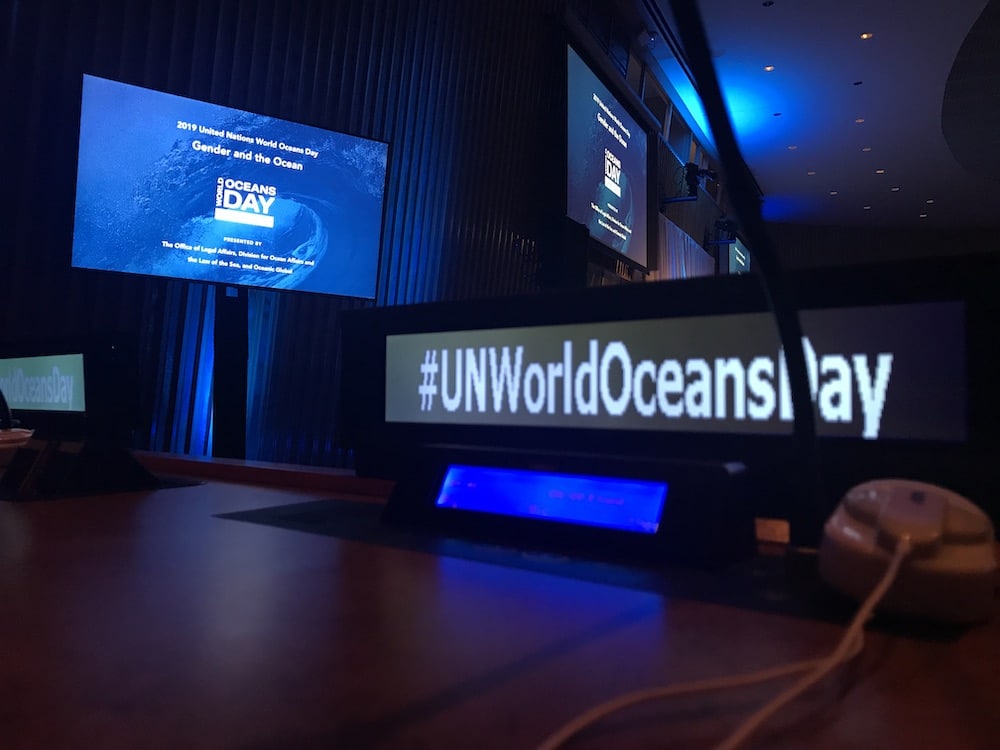
Every day should be World Oceans Day, but until my wish is granted we’re grateful for the one day a year the oceans get global attention.
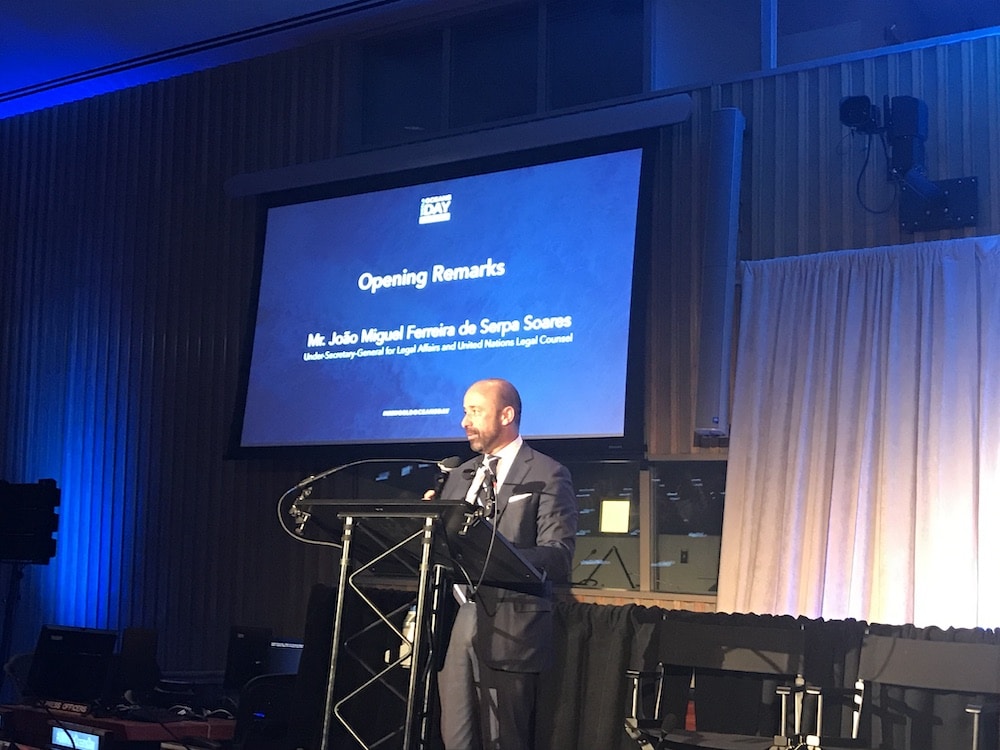
Welcome to UN WOD 2019!
In 2008 the United Nations officially recognized World Oceans Day to be celebrated on the 8th June every year. Since that was a Saturday in 2019, the celebratory event at the United Nations Headquarters in New York took place on Friday 7th themed: Gender and Oceans.
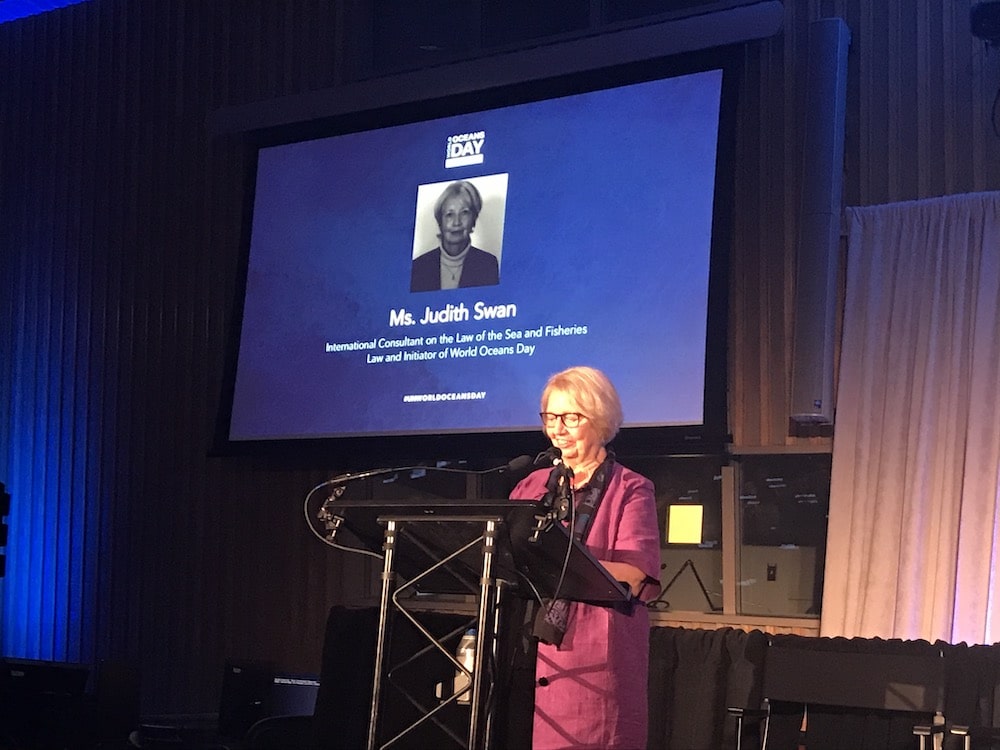
Judith Swan, International Consultant on the Law of the Sea and Fisheries Law, and Initiator, World Oceans Day.
This year the strategic partner Oceanic Global organized a morning of storytelling by men and women and an afternoon panel discussion regarding solutions for gender issues with panellists from the Human Rights at Sea, UN Division of Ocean Affairs and Law of the Sea, the World Surf League and many others.
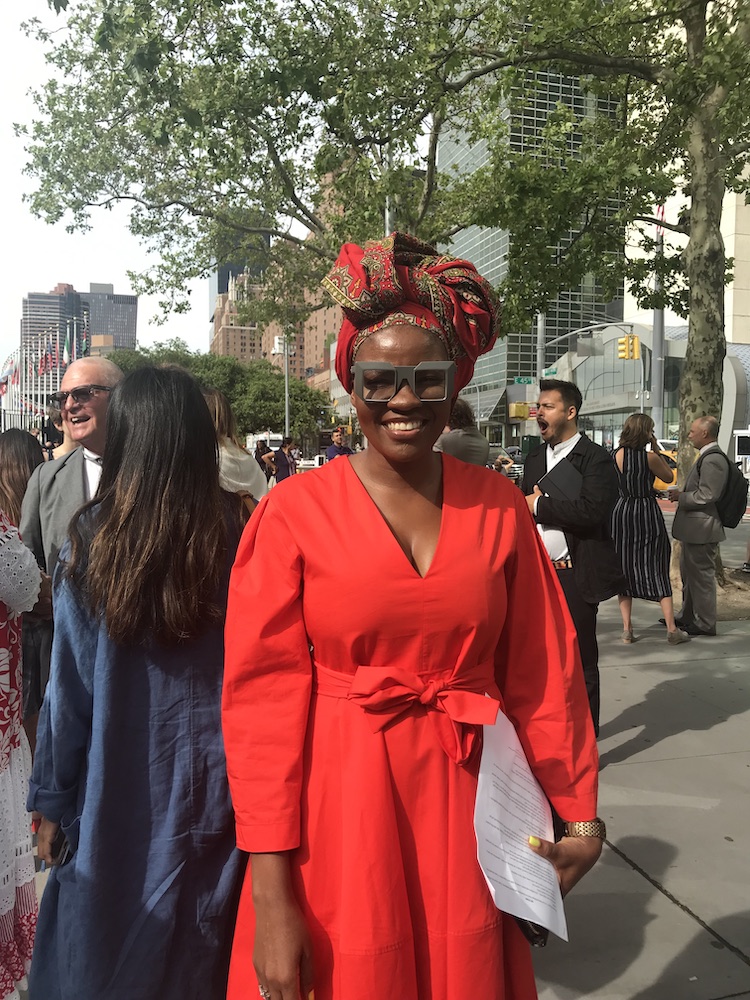
Kudzi Victorino Dykman at the start of UN WOD 2019 at the NY Headquarters.
Some highlights of the day were the testimony of Kudzi Victorino Dyckman. She was born in Mozambique as the oldest of 14 children and worked as a young child to help provide for her family. Her strong willpower and gratefulness eventually led to her becoming the first female Dive Instructor in Mozambique!
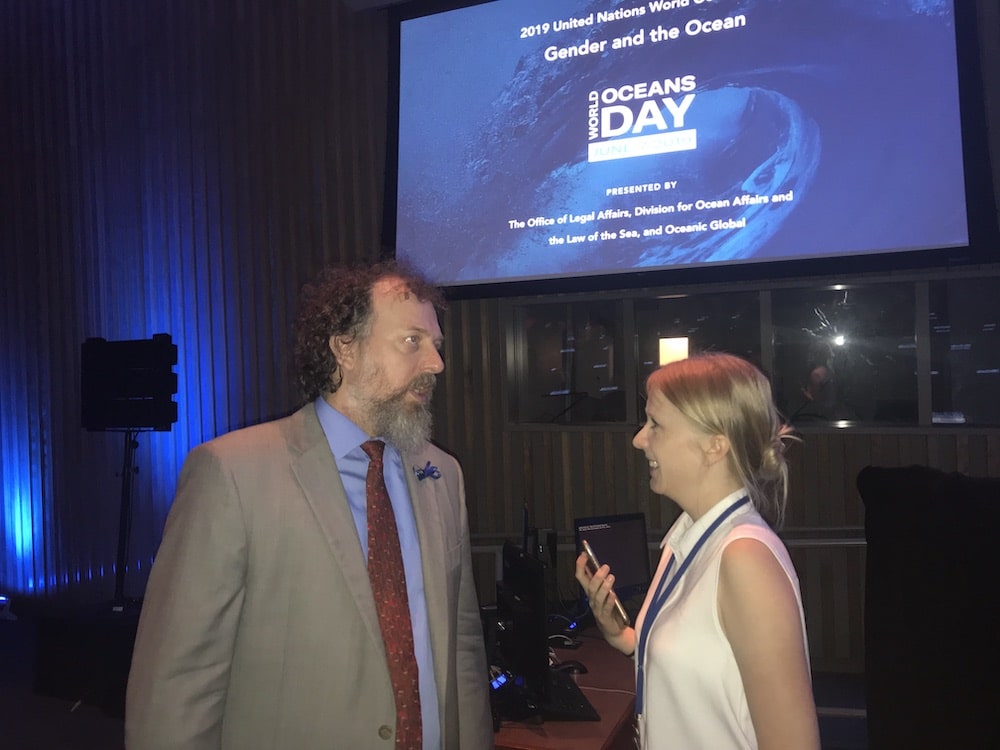
François Bailet from the Office of Legal Affairs – Division of Ocean Affairs and the Law of the Sea – is the driving force behind the UN WOD. Here, in discussion with Amanda Elise Stoltz.
And what about the real life Moana: Aunofo Havea – a true seafarer following the stars and her dream, from cleaning to cooking to captain because she wanted to be the decision maker, while raising a family! Some people in the dive industry might know her as an inspirational power woman operating in Tonga – her dream since she first swam with the whales.
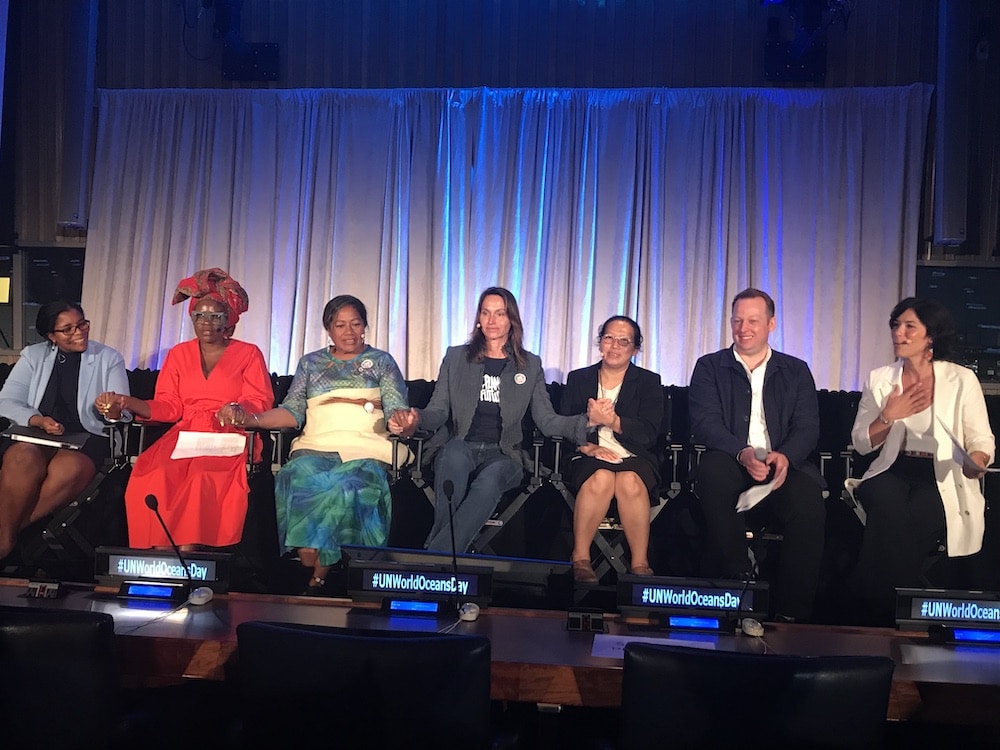
Storytelling panel: Ms. Angelique Pouponneau, Kudzi Victorino Dykman, Aunofo Havea, Anne de Carbuccio, Patima Tungpuchayaku, and moderator Mariasole Bianco.
We also heard goosebump testimonies from a former slave at sea and now the founder of Labour Rights Promotion Network Foundation, Mr. Tun Lin.
In between the stories and panels, I had the honour to announce the winners of the 6th UN World Oceans Day Photo Competition. The overall winner, David Salvatori from Italy, presented a stunning shot of a diver between floating tunicates! A symbol that we need the motion in the ocean to keep them rich and full with life. Check back here tomorrow to see the images!
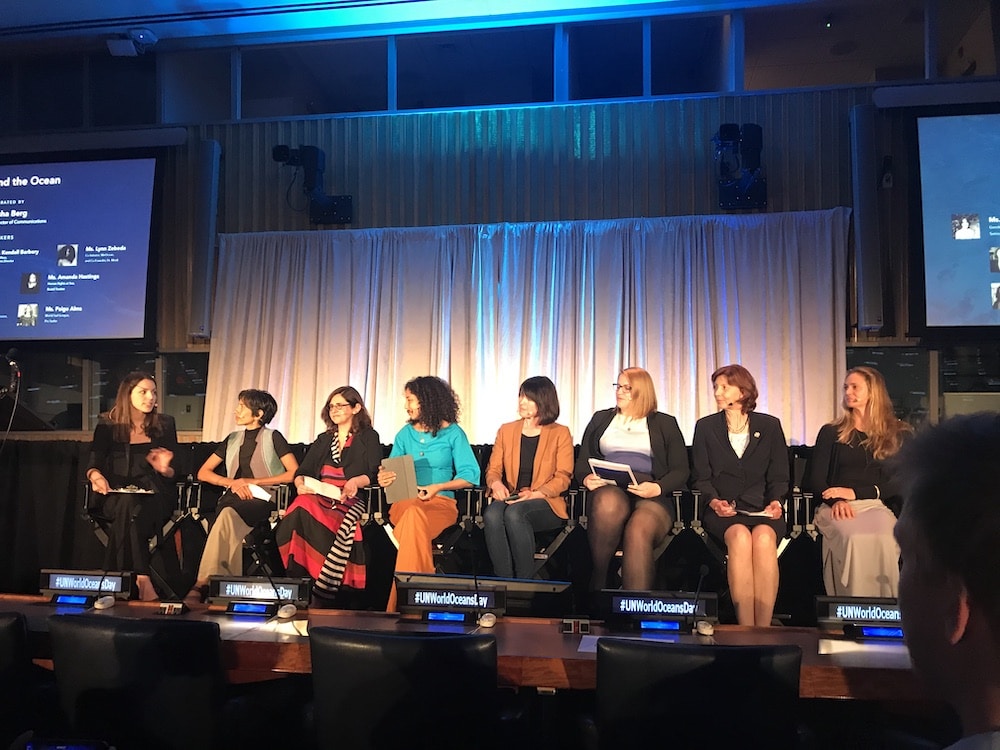
Expert panel with moderator Natasha Berg, Anamika Amani, Francesca Santoro, Lynn Zebeda, Kendall Barbery, Amanda Hastings, Gabriele Goettsche-Wanli and Paige Alms.
The day ended with a compelling speech by Dr. Sylvia Earle about the knowledge we have and the choices we make, or rather not make fast enough. We have to make peace with nature and that is not a gender issue but a cultural one. But women with superpowers all around the world can make a difference as we should provide the values at home so they become second nature.
We can do this partly by embracing the differences there are between men and women and using the differences in decision making like ones we all make at home: what shall we eat? We have to stop eating marine life because we’re all guilty in playing a part in the atrocities happening at sea if we don’t. In our food choices, we are implicated in everything from overfishing to forced labour at sea.
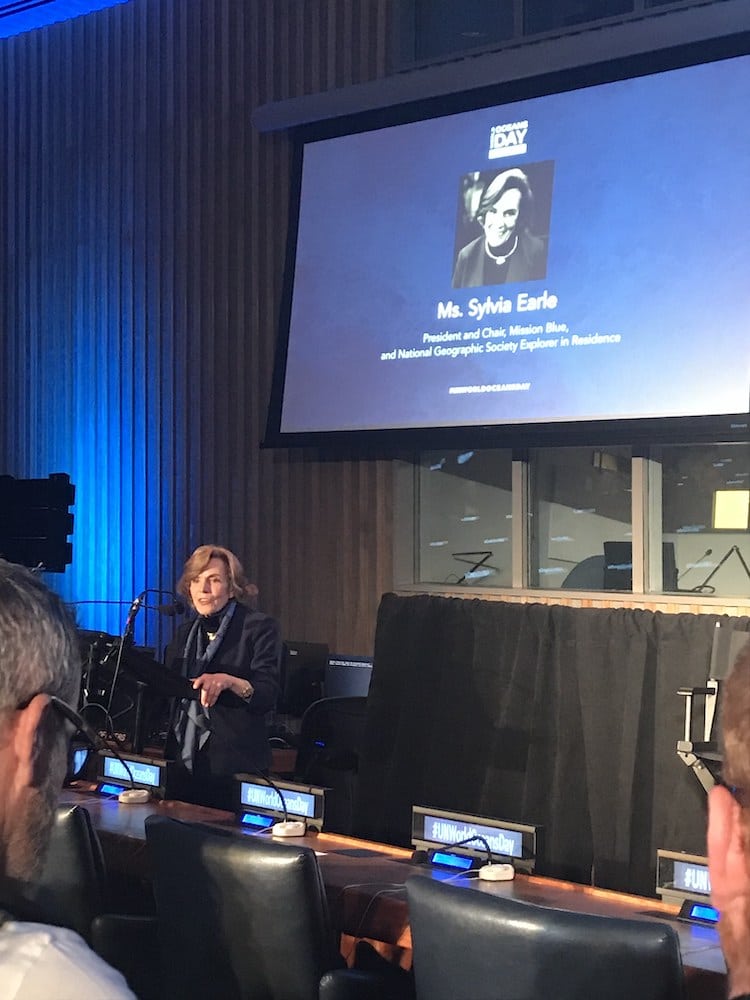
Dr. Sylvia Earle delivering the closing keynote speech and moving everyone to tears.
When a scientist with the experience and hours in the ocean like Dr. Earle tells you what to do… you better listen!
Conclusion: Gender and the Oceans seemed like a difficult theme when it got announced months ago, but the day was too short once the dialogue began! To be continued…
Find out more about Ellen and her work at www.ellencuylaerts.com.
Blogs
Saba’s Plan for a Coral Comeback

Saba has an exciting new initiative to restore its coral reefs. This new project, running from 2024 to 2026, will focus on reviving key species in the island’s underwater ecosystems. With a collaborative team from the Saba Conservation Foundation (SCF) and Van Hall Larenstein (VHL) University of Applied Sciences, the project aims to restore both corals as well as sea urchins.
This initiative is centered around coral restoration, specifically reviving two essential coral species—staghorn coral (Acropora cervicornis) and elkhorn coral (Acropora palmata). By mapping parent colonies and using a technique known as coral gardening, SCF will create and maintain coral nurseries. These corals will eventually be outplanted at key reef sites around Saba to not only expand the number of coral colonies, but also provide essential fish habitat. The project focusses on installing coral nurseries, training staff with the newest techniques and starting with the restoration of key reef sites.

Reef Cleaners to the Rescue
It’s not just corals getting a makeover—this project also shines a spotlight on the essential role of grazers, particularly sea urchins. VHL is leading the charge on cultivating and restocking two key sea urchin species, West Indian sea egg (Tripneustes) and long-spined sea urchin (Diadema), known for their ability to keep algae in check. By removing algae, which are important competitors of corals, they help the coral to thrive. By restoring these “reef cleaners,” Saba’s project will give corals the breathing room they need to grow, setting the stage for a healthier, more balanced marine ecosystem.
From Tiny Urchins to Big Goals
The project will be funded as part of the Dutch Government’s Nature and Environment Policy Plan (NEPP) 2020-2030 for the Caribbean Netherlands, a comprehensive initiative aimed at conserving and restoring the unique natural environments of the Dutch Caribbean islands, including Saba, St. Eustatius, and Bonaire. This project is aiming for big milestones: build and maintaining coral nurseries, the expansion of urchin cultivation facilities, and the creation of a dedicated research center. By 2026, the project hopes to ramp up coral and grazer restoration, with the ultimate goal of extending these efforts across the Dutch Caribbean. By linking local initiatives to broader regional goals, Saba’s restoration project promises to leave a lasting impact on both the environment and the community.
Find out more about the DCNA at dcnanature.org.
Blogs
Reef-World marks two decades of marine conservation: strengthening impact amid coral reef threats

Empowering ocean stakeholders to tackle future challenges and ensure the survival of coral reefs and humanity
2024 marks the 20th Anniversary of The Reef-World Foundation’s tireless efforts for global coral reef conservation. The UK charity is the international coordinator of the UN Environment Programme’s Green Fins initiative, known as the leading voice in sustainable marine tourism. Today, Reef-World released its 2023-2024 Impact Report outlining a year of substantive growth and impact in its marine conservation programmes.

Impact Report Highlights:
- Impressive improvements in environmental behaviours to protect coral reefs by the marine tourism industry as the global participation of Green Fins increases.
- Continued capacity building for government and NGO staff to effectively manage marine tourism activities in Asia, Caribbean and Red Sea regions.
- For the first time in Green Fins’ 20-year history, tourism operators have achieved ‘Best Environmental Performer’ status by demonstrating the lowest possible environmental impact in their environmental assessments. In 2024, three dive operators achieved this challenging milestone.
- Significant increases in global participation of Reef-World’s innovative digital conservation tools.
- 138 Green Fins dive operator members achieved the strict threshold for PADI Eco Center recognition.
- Developed four new educational materials and translated two into 16 languages to support the marine tourism industry in achieving sustainability targets.
- Establishing a new Reef-World Development strategy and recruiting new roles – Development and Programmes Managers.
- Reef-World’s board welcomes new Chair and Trustees strengthening organisational leadership.

Reef-World started as a one-person mission to inspire and empower communities to act in conserving and sustainably developing coral reefs and related ecosystems. Today, the team of 12 continues to meet this mission by inspiring and empowering the global marine tourism community to be exemplary sustainability leaders by using the Green Fins guidelines and tools to simultaneously use and protect the world’s precious reefs.
In April 2024, the fourth global coral reef bleaching event was confirmed. Reef-World’s work has never been more urgent as the marine environment, and the benefits they provide humanity, continue to be eroded by global threats. The reduction of local threats, like those from the marine tourism industry, is an essential step to ensuring a future where coral reefs survive and continue to support the millions of people who depend on their ecosystem benefits. Reef-World’s work buys time for coral reefs and related ecosystems to be resilient to the impacts of global threats.
“Right now our corals are facing the greatest fight of their existence as the terrifying predictions of the steps towards their complete extinction are starting to come true. But all is not lost, reefs are resilient and they have existed on this planet for millions of years. We must take action now, to buy time for reefs by reducing threats facing them and allowing them to react and adjust to the changing environment they need to survive in.” – Chloe Harvey, Executive Director
Looking Forwards:
Like coral reefs, the Reef-World team needs to be resilient in the face of the complex challenges of the conservation sector. Reef-World has invested significantly in developing a Culture of Care to ensure the well-being of its team on a daily basis, continuing to be an exemplary employer to enable its team to best achieve the mission for coral reef conservation.
With the foundations of a Culture of Care and organisational development laid, Reef-World is emerging from the end of a natural organisation life cycle, that brings the challenges of growth and scale, stronger than ever. With a new strategy in place to generate much needed resources, Reef-World is excited for the opportunities to leap forward, continue to scale our impact and lean into new innovations and untapped opportunities for marine conservation.
We continually strive to become a forward-thinking organisation that delivers on our goals and commitments to our stakeholders with fresh approaches and not being afraid of steering away from a “normal approach.” This approach is not only applied to our programmes of work but also internally and carries over to our Culture of Care for our team.” — JJ Harvey, Operations Director

The Reef-World Foundation is immensely grateful for the continued support of its grant funders: UN Environment Programme, IUCN’s Blue Natural Capital Financing Facility, Adventure Travel Conservation Fund, PADI Aware Foundation, and World Nomads Footprints Program.
Reef-World would also like to express its gratitude to international partners whose vital support has resulted in significant tangible benefits for our work and mission: PADI; Professional SCUBA Schools International (PSS); Explorer Ventures; 1% for the Planet; ZuBlu; Snorkel Venture, GSTC; Dive O’Clock; Seven Dragons; DiveAssure and Eco Beach, without whom these achievements would not be possible.
The full 2023–2024 Annual Impact Report is available on Reef-World’s website.
-

 News2 months ago
News2 months agoIconic SS United States to become the World’s Largest Artificial Reef
-

 News3 months ago
News3 months agoBook Review – 52 Assignments: Underwater Photography
-

 Gear News3 months ago
Gear News3 months agoDYNAMICNORD – New German diving brand enters the British market
-

 News3 months ago
News3 months agoExploring Cenote El Pit: A Diver’s Dream
-

 Gear News3 months ago
Gear News3 months agoTry BARE drysuits (and maybe even win one!) this Friday with Sea & Sea at North West Dive Fest
-

 Marine Life & Conservation3 months ago
Marine Life & Conservation3 months agoBook Review: Coral Triangle Cameos
-

 Blogs2 months ago
Blogs2 months agoDive the Egyptian Red Sea this Autumn with Regaldive
-

 News3 months ago
News3 months ago2024 Ocean Art Underwater Photo Competition Announced















